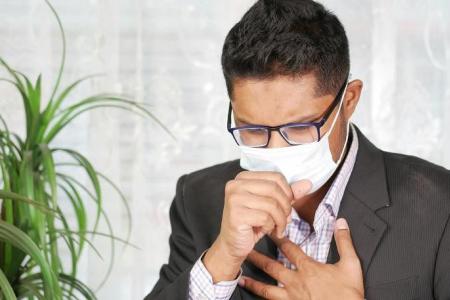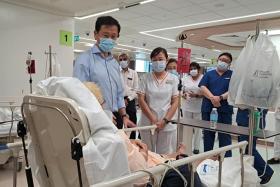Increase in lingering coughs due to rise in acute respiratory infections
More people suffered from hard-to-kick coughs in Singapore in the last few months of 2023, as respiratory viruses hit high gear.
General practitioners (GPs) The Straits Times spoke to said that while it is common for people to have a cough at the end of the year, largely due to the colder and wetter weather, they saw upticks in the number of patients battling lingering coughs and returning to their clinics repeatedly.
Dr Dana Elliott Srither, a GP with more than 20 years of experience, said: “While we do not know what the specific viral causes are because we do not routinely test like how we did for Covid-19, we are certain it is a top symptom of the nasty mix of common cold, influenza, and even Covid-19.”
At Singapore’s 25 polyclinics, the number of cases of acute respiratory infections went up during the year end.
According to Ministry of Health data for the week ending Dec 2, there was an average of 2,970 cases of acute respiratory infections seen a day at the polyclinics. This number went up to an average of 3,590 cases daily a week later.
Dr Sewa Duu Wen, who heads the Department of Respiratory and Critical Care Medicine at the Singapore General Hospital, said the year-end damp weather can create favourable conditions for virus survival.
“(The) moisture in the air may enhance virus viability and airborne transmission, potentially contributing to the persistence of respiratory infections during the rainy season. There is also some evidence suggesting that lower body temperature may reduce host immunity and predispose one to risk of respiratory tract infections,” he said.
Dr Sewa added that it is possible to contract multiple respiratory viruses successively or even concurrently, as they share similar transmission routes.
“At the height of the Covid-19 pandemic, we noticed a reduction in the rate of other common viral respiratory tract infections due to the highly transmissible Covid-19 strain ‘outperforming’ other virus infections. Now we are seeing the re-emergence of infections such as influenza. The overlapping symptoms and seasonal nature of these viruses contribute to the increased likelihood of back-to-back infections,” he said.
One person who took months to shake off her cough is communications executive Leong Pei Yi, 36. Her cough started in August 2023 from a bout of flu and lingered despite other symptoms going away.
“It was a thick, phlegmy cough from deep within the lungs, and it lasted about three to four months. I had to use strength to cough and purge the phlegm from my chest every time. Yet the phlegm, which was dark yellow and sometimes green, persisted,” Ms Leong said.
She was given flu medication and the decongestant Fluimucil to clear the viscous mucus, but she “got sicker and the mucus got darker and thicker”.
“After two courses of antibiotics, the coughing and congestion in the chest did not subside,” she added.
Her sleep was disrupted as she would wake up a few times during the night. She was overwhelmed by the coughing, which often woke her parents, who are light sleepers, in the next room.
“I was extremely exhausted all the time and was convinced I was going to die. I found it difficult to function at work as I was constantly worried that the people around me were annoyed or concerned,” she said.
Ms Leong believed her health had been weakened by Covid-19, which she caught in July 2022.
“The Covid-19 cough then was dry and itchy. It was a hacking sort of cough that would start out of the blue. It also lasted for about four months,” Ms Leong said.
Like Ms Leong, entrepreneur Vikram Mengi, 54, ended up with a long-drawn, dry and itchy cough that “started about a week or so” after he recovered from a Covid-19 infection in December.
About the cough, when it was at its worst, he said: “(It was because of) mucus that dripped and irritated the back of my throat. I could not say it affected my everyday life, except for when I coughed and was being an irritant. I was a bit socially awkward then because, as you know, people seemed concerned when someone coughed.”
Mr Mengi was prescribed Fluimucil and nasal spray “that should do the job”.
But he is still coughing, saying: “It is a slow process.”
Dr Sewa said most respiratory infections are self-limiting and do not lead to prolonged or permanent lung damage. However, a severe lung infection can lead to critically low oxygen level and become a disseminated infection affecting multiple organs, posing a threat to one’s survival.
“The population at risk includes those of extreme ages (very young and very old), patients with multiple health diseases or those with weakened immune systems. Timely medical intervention and appropriate treatment are crucial to prevent lasting lung damage,” he said.
Dr Sewa advised individuals above 65 to prioritise annual influenza vaccinations apart from just taking pneumococcal vaccinations, and to consider other relevant vaccines.
Get The New Paper on your phone with the free TNP app. Download from the Apple App Store or Google Play Store now


